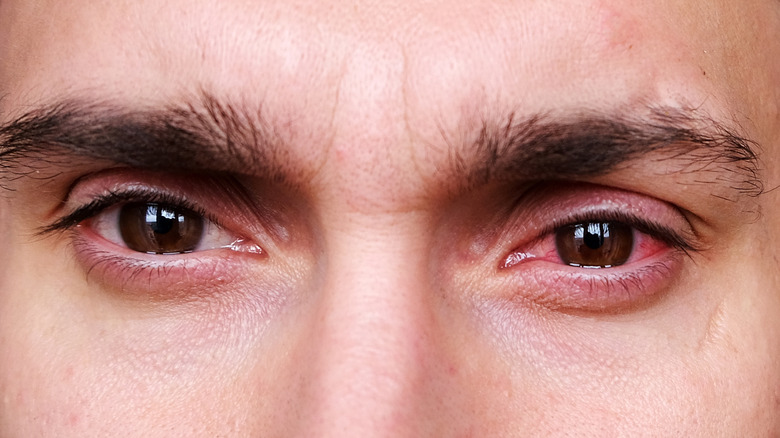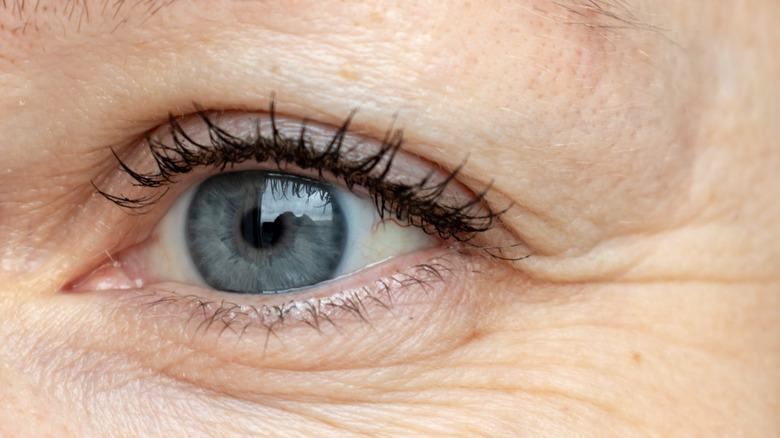Can Your Eyes Get Sunburned?
We all know to slather on the sunscreen whenever we're going to be outside in the sunshine, to protect our skin from sunburn in the short term and damage from the sun's ultraviolet (UV) rays in the long term. But there are body parts that are susceptible to sunburn and long-term damage that we tend to overlook when we're preparing for a day at the beach or on the slopes, and they include the eyes — both the eyeball itself and the eyelids.
Just as the rest of your body is vulnerable to sunburn, so too is the eye. Sunburn of the eyeball is called photokeratitis, which is technically an inflammation of the cornea, the conjunctiva (the tissue over the white part of the eyeball), and the inside of the eyelids, according to the American Academy of Ophthalmology. Most of the time, sunburned eyes occur as a result of the sun reflecting off a surface, such as snow, water, or sand (via Insider). But it can also happen just being out in the sun for a long period of time without adequate protection. Sunburn of the eyelids can also occur.
Symptoms of sunburned eyes
Sunburn of the eyes can cause relatively minor, but annoying, symptoms, or in some cases, symptoms that are quite severe. Like sunburn of the skin, symptoms of photokeratitis don't usually appear right as the sun is doing its damage, but after a period of time. Common symptoms include redness and pain in the eyes, blurry vision, tearing, swelling, sensitivity to light, headache, a gritty feeling in the eyes, and eyelid twitching, according to the American Academy of Ophthalmology. These symptoms tend to last between 6 and 48 hours (via Insider) and eventually resolve on their own.
The longer your unprotected eyes were exposed to UV rays, however, the more severe photokeratitis will be. It may produce such symptoms as an inability to open your eyes or highly impaired vision, which may include seeing a shadow in the middle of your vision or seeing halos (via Healthline). In rare instances color vision may change. If you experience these symptoms, particularly if they persist for longer than 24 hours, consult a doctor. She may prescribe antibiotic eye drops to prevent infection.
To relieve mild symptoms of photokeratitis, first off, stay out of the sun. It's best to retreat to a dark room to give your eyes a rest. Take out contacts if you wear them, and apply a cold compress to your eyes. For pain, you can take an over-the-counter anti-inflammatory pain medication. Try not to rub your eyes, which could cause more irritation, and avoid applying makeup until your eyes have healed.
Sunburn of the eyes can cause long-term damage
Your eyes will slowly feel better and eventually heal from a sunburn, but as with any sunburn, damage has already been done to the cells. Exposure to the sun's UV rays can cause you to develop problems in the future, such as cataracts and benign but lasting growths on the eye, particularly if you experience photokeratitis multiple times. The damage adds up and can cause long-term issues (via Insider).
Although it's unclear if there's a direct link between getting sunburned eyes or being exposed to UV rays and eye cancer (per Popular Science), there is still the possibility of developing ocular melanoma, an extremely rare form of cancer but the most common primary cancer of the eye in adults (per the National Organization for Rare Disorders).
As for the eyelids, because they are skin, it's clear that sun damage can cause cancer there. Of all cases of skin cancer, 5-10% occur on the eyelid (per Cancer.Net). Not as scary as cancer — but perhaps a bigger motivator to protect your eyes from the sun — is the fact that exposure to UV rays quickens aging of the skin around the eyes.
How to prevent sunburned eyes
Sun damage can happen throughout the year, in different types of weather (per Insider). Sunglasses are the best way to protect your eyes year-round. Look for those that are polarized (to lessen the effect of reflected light), labeled "100% UV protection" or "UV400," and have bigger frames to cover more of the area around your eyes (via Insider). Wearing a wide-brimmed hat will also block sunlight from hitting your face.
To prevent sun from scorching your eyelids, it's safe to use a sunscreen around the area, but not in your eyes, provided the formulation is made for sensitive skin. Sunscreens that contain zinc or titanium dioxide are good choices, particularly in stick form, as they won't melt and are easy to apply, according to the Skin Cancer Foundation. Other good options are tinted mineral powders or cream concealers with SPF ratings.




